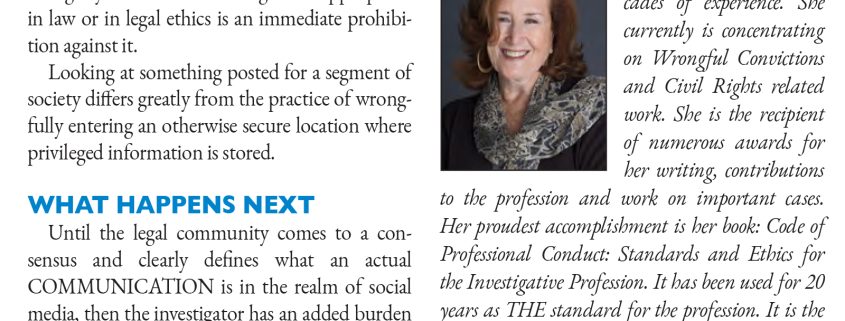A Private Investigator Talks Social Media Investigations
For California private investigators, knowing where to find evidence isn’t always enough. Los Angeles private detective agencies have to be especially careful when conducting social media investigations to make sure that neither the type of information we locate online nor the means we use to find it breach any federal or state privacy laws. These laws themselves are works in progress, subject to a great deal of interpretation, most importantly by judges who then create legal precedents with the judgements they hand down. As any L.A. private investigator will tell you, it’s no small job keeping up with it all. Here at Kinsey Investigations, we use social media and other online investigation tools for many of our clients’ cases. At the end of the day, especially when the evidence we turn up must be admissible in court, it’s vital that we know about and take all important legal considerations into account.
Social Media Investigations and Privacy Laws
For social media, as with many virtual and Internet-related platforms, laws and lawmakers are struggling to keep pace with the ever-changing online landscape. This has particular ramifications for law enforcement, lawyers and private investigators, as a great deal of information is posted online, but only some of what’s readily available there is admissible in court. Privacy laws and a patchwork of state and municipal legislation only muddy the waters when it comes to what can be used in a social media private investigation as well as entered as evidence for legal proceedings. California private investigation firms, in particular, must stay up to date not only on applicable state legislation, but also legal decisions and precedents handed down by judges. As recently described by investigator Kitty Hailey in the September/October, 2023 issue of P.I. Magazine, what can be considered an illegal invasion of an individual’s privacy has a lot to do with how the law interprets what it means to communicate.
In her article “Ethics, Technology and Communications,” Hailey dives deep into the privacy ramifications for individuals who share information on social media and other online platforms as well as the law’s understanding of who is allowed to access that information and how it can be used. She suggests that if we define the word “communicate” by some of Google’s synonyms for it including “interface, interact, commune, meet, and liaise,” then, “it could be interpreted that there must be an exchange of information, thoughts and ideas for an actual communication to occur.” However, if someone concerned about privacy of information shared online instead interprets communicate to mean, “convey, tell, impart, announce, report or relate,” the legal understanding of what constitutes privileged or private information changes. The fact that laws about online privacy differ substantially, state to state, and that judges have the ability to reinterpret and create new legal precedents for them, makes understanding all this even more difficult. If you’re feeling like you’ve stumbled into an “English 101” or “Intro to Law” university course, you’re not alone. These are the everyday headaches of legal professionals, but can sound like complete Greek to a layperson.
How Kinsey Investigations Uses Social Media and Other Online Investigations
Hailey does an excellent job of breaking it all down in her article (reposted with permission here), including useful advice for anyone who posts information about themselves and their families/friends online. Under her sub-heading “Hiding or Removing Evidence,” she writes, “It is not generally within the realm of an investigator to advise a client regarding the privacy settings of a social media page. However, it is frequently advised by an attorney that settings be made private and photographs that might be damaging to a case (such as an injured person’s ability to dance, play golf or bowl) should be removed from that site.” Hailey also points out that, while searching for evidence, “An investigator is not above the law. Using illegal means to ‘break in’ either physically or virtually is, of course, not allowed.” If you want greater insight into how privacy laws may or may not protect the information you post online, we recommend reading her article in its entirety.
Kinsey Investigations offers social media investigations, both as a standalone service as well as part of other kinds of private investigations for our clients. When working with an attorney or gathering evidence for a civil suit, we comply with all privacy laws and keep federal as well as California state legislations and applicable legal precedents top of mind. Our team of female private investigators know the law, and our job is to work within it to serve our clients as best we can.























